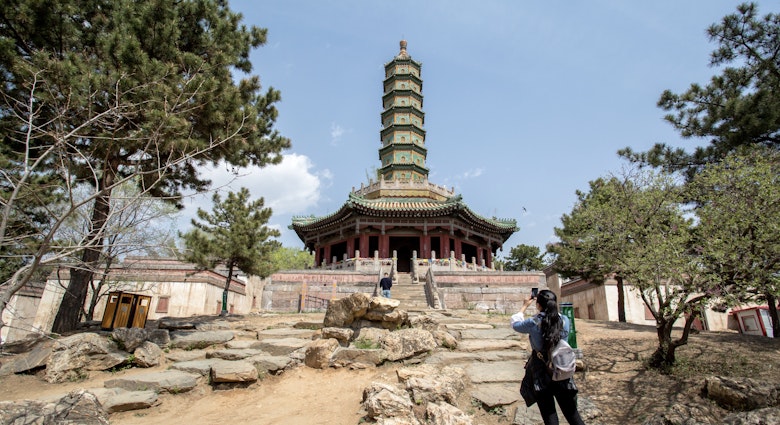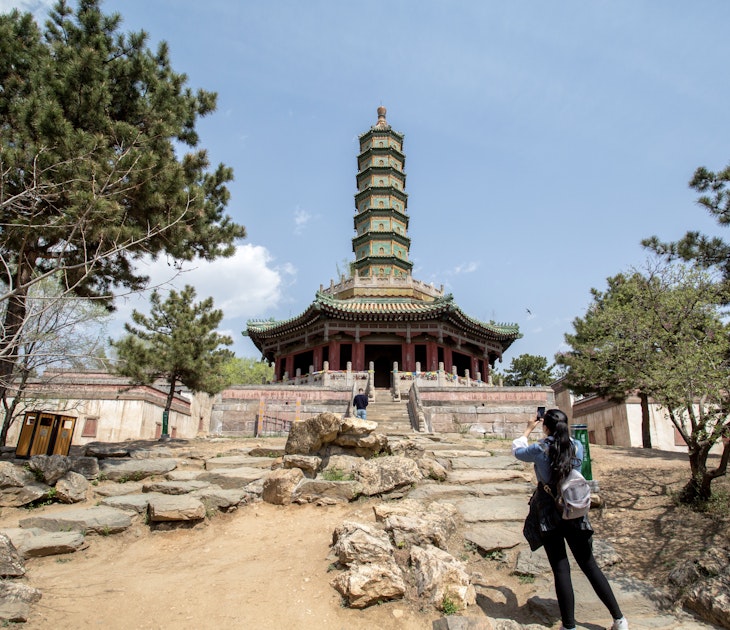
The 15 best things to do in Xishuangbanna: food and culture in China's little corner of Southeast Asia

Jan 10, 2022 • 6 min read

From celebrating at the Water Splashing Festival, to trying the best Dai cuisine, here are the top things to do in China's Xishuangbanna prefecture © Keren Su / Getty Images
The lazy flow of the Lancang (Mekong) River belies the pace of modern development in the tropical jungles of Southwest China's Xishuangbanna prefecture. Once barely a guidebook footnote as a trailhead for hard-to-reach jungle treks, modern 'Banna has come to the fore as a hub for culture lovers, "sun and more sun" travelers, and those looking to link China into a longer overland Southeast Asia journey.
While domestic tourists hone in on the always-pleasant weather and thriving international resorts scene, foreign travelers more often focus on the remote market towns and surrounding stretches of verdant rainforest, a combination of nature and culture that's hard to beat. Here are the best things to do in Xishuangbanna prefecture.
Explore Dai culture at the Water Splashing Festival
Top of most visitors' lists is experiencing the culture of the Dai minority group, the largest in Xishuangbanna, and one of a broad swathe of Tai communities that stretch across international borders from China to Thailand. The most popular draw is the Dai Water Splashing Festival in April, a three-day celebration of the Dai New Year where locals and visitors make merry with waterguns, overflowing pots, weaponized squirt bottles, and just about any other conceivable means of washing away the old year's impurities and ill luck to start the new year afresh.
Shop for local fashion
All of Xishuangbanna's minority cultures follow their own fashion trends – from Dai ladies' bright skirts and sarongs belted in silver to the Hani and Bulang in elaborate headdresses (the former decorated with flashy coins and jewelry, the latter in fresh-picked flower blossoms), and Jinuo women in striped tunics and black skirts. At weekly markets and Jinghong boutiques alike, there are plenty of opportunities to try these on for yourself and perhaps add a little 'Banna flair to your wardrobe.

Glimpse authentic rural life at the weekly markets
A trip to Xishuangbanna's market towns is no stop at the local corner store – the most remote hill town markets draw locals from up to a day's walk away, and for tourists this is one of the most authentic ways to get a glimpse of rural life in Xishuangbanna outside of the tourism developments. The Thursday market in Xiding and Sunday market in Menghun are two of the favorites, but ask around for others to get way off the beaten track.
Smell the flowers in Jinghong's garden
Jinghong's Tropical Flower and Plant Garden blooms under the tropical sun, filled by the scents and colors of over 1000 species native to the region. Signage and information is thorough enough to please dedicated botanists, while even casual visitors will enjoy a stroll through the vast pleasant grounds.
Take the train from Kunming to Xishuangbanna
The days of 14-hour overnight bus marathons from Yunnan capital Kunming are long gone – the Chinese stretch of the planned Kunming–Singapore Railway began operation in December 2021, cutting travel time to Xishuangbanna to a comfy three hour train trip.
See a curated version of Dai culture in Menghun
The Dai Minority Park in Menghun offers an alternate, carefully cultivated, option to experience Dai culture. Formerly a quiet riverside village, the cultural park is now stuffed with traditional-style architecture and ablaze with bright Dai clothing, and the annual Water Splashing Festival can be enjoyed twice daily at Water Splashing Plaza.

Sip locally grown tea
Tea lovers have long been drawn to Xishuangbanna – fermented Pu'er tea is still grown and processed in the eponymous region next door, while 'Banna's Xinghuoshan region offers a smaller but closer option. Admire the bushy hillsides where these brews come to life before tasting a sample.
Taste a brew of the local coffee beans
Though better known for tea, Xishuangbanna is also a coffee-growing region and the locally produced Arabica beans, originally brought and cultivated by French missionaries, are now roasted fresh in the region and served in local coffee shops.
Cruise the Lancang River from Jinghong
Tour operators and private pilots set sail for trips along the Lancang (Mekong) River out of Jinghong. Bigger outfits offer dinner shows and dance routines, while smaller private boats focus more on the independent traveler segment looking to enjoy the sunset and Jinghong's city lights.
Visit ancient Dai temples
Tucked into out of the way corners of Xishuangbanna are ancient but active Dai temples that still are still used by the local community – the Octagonal Pavilion in Jingzhen (built in 1701) and Damenglong's White Bamboo Shoot Pagoda (originally from 1204) offer vibrant examples of Dai Buddhism and, for lucky travelers, the chance to interact with resident monks or reverent local visitors.
Kick back at a resort pool in Jinghong
Xishuangbanna has seen a boom of international chain hotel resorts in recent years, and visitors looking for a little tropical sun and a cold drink by the pool could do worse than the resort development zones just outside of Jinghong.
Blending into the surrounding jungle with plenty of paths and gardens to wander, the combines local architectural styles with modern amenities like indoor and outdoor pools.

Shop for street food at Jinghong's Night Market
There are few better places to sample Dai street food than the Jinghong Night Market, on the far side of the Lancang River under the lights of newly constructed temples and golden pagodas. Whether just to stroll the waterfront or for serious handicraft hunting among the stalls, it's the go-to end to a day in the city.
Experience the rainforest at Sanchahe Nature Reserve
Sanchahe Nature Reserve's 1.5 million hectares of forest offers endless scope for experiencing 'Banna's wild rainforest in purest form – though visitors may want to skip the Wild Elephant Valley, where managed animal experiences can leave a bad taste.
Sample unique Dai cuisine
Spicy, sour, citrusy Dai cuisine is like nothing else in China – culinarily closer to Laotian or Thai than even other Yunnanese kitchens. Chili pepper and lemongrass sauces backed up by lime juice and wild mountain herbs combine for unique flavors in dishes like spicy cold noodles and ghost chicken. Every meal is a delight.
Wander pleasure gardens that once belonged to Dai royalty
Built nearly 1300 years ago as a pleasure garden for a Dai royal family, 65 hectare Manting Park is open these days for visitors looking for a little nature immersion on the edge of Jinghong. Manicured gardens and attractive traditional-style buildings make for a pleasant stroll, though visitors more interested in an authentic cultural experience may want to avoid the round-the-clock culture performances and evening bonfire party.
Xishuangbanna is on our 2022 Best of Travel list. For more stories from some of the world’s most exciting destinations click here.
Safety recommendations and restrictions during a pandemic can change rapidly. Ïã¸ÛÁùºÏ²Ê¼´Ê±¿ª½± recommends that travelers always check with local authorities for up-to-date guidance before traveling during COVID-19.
You might also like:
5 epic train journeys to take in China
The ultimate guide to things to do in China
How do I get a visa for China?
Explore related stories

Skiing
What’s new and exciting for travelers in China now that it's reopenedApr 5, 2023 • 5 min read





 Local VoicesEverything you need to know about visiting New York in December
Local VoicesEverything you need to know about visiting New York in DecemberNov 25, 2024 • 10 min read
